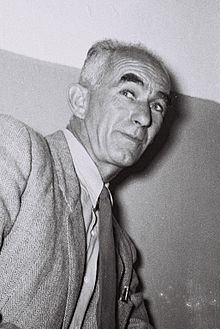Isser Be'eri
Isser Be'eri (born as Isser Birenzweig or Bierenzweig in 1901 in Poland ; died 1958 ) was the first head of the Israeli military intelligence service Aman .
As he was quite tall, he was nicknamed Big Isser (Isser Ha'Gadol), while his colleague, Mossad chief Isser Harel, was called Little Isser .
Be'eri had been a member of the Haganah since 1938 and headed its intelligence service (Shai). In 1948, after a meeting between him and Re'uwen Schiloach , it was decided to establish three intelligence services, the domestic service Schin Bet , the military intelligence service, which Be'eri took over, and the foreign service, at that time still a subdivision of the Foreign Ministry, headed by Schiloach later it became the Mossad . Be'eri was in charge of the military intelligence service only until 1949, when Ben Gurion deposed him for his rigorous and unauthorized leadership style.
Be'eri was a fanatic in that he wanted Israel to be the perfect state. He took rigorous action against corruption or other failures. A few hours after his appointment as head of military intelligence, on June 30, 1948, he sentenced Captain Meir Tobianski to death in a court martial and had him executed immediately afterwards. He thought he was a spy and a traitor, which he later upheld. Tobianski was a veteran of the Haganah and at the same time an electrical engineer with the Palestinian power company. During the War of Independence, the Jordanian artillery landed devastating hits and the Haganah secret service, Shai (especially the commander in Jerusalem Binyamin Gibli), suspected a spy and Tobianski was suspected. He was believed to have passed information on to his British superiors in the electricity company, and they gave it to the Jordanians. Tobianski had been a major in the Royal Engineers during World War II. The court martial consisted only of former Shai members and met one day before the Shai officially dissolved. Later, however, members of the court martial, apart from Be'eri, claimed that they thought they would only be present during an interrogation. The subsequent shooting attracted the attention and displeasure of other military personnel. Ben-Gurion was only informed a few hours later, Tobianski's widow only learned of her husband's death three weeks later in the press and wrote a letter to Ben-Gurion. The case was investigated, Tobianski rehabilitated and posthumously promoted to captain. The widow with the son received a state pension.
Shortly after the shooting of Tobianski, he took action against the mayor of Haifa Abba Hushi and his right-hand man, the taxi owner Yehuda Amster, who he suspected of having passed on information to British and Arab officials during the protectorate. He had Amster taken to a secret camp and tortured and interrogated for two and a half months.
In the summer of 1948 he had the Arab informant Ali Qassem executed without trial because he suspected that he was a double agent. That broke the barrel for Ben Gurion and he dropped Be'eri. He was released from the military and then charged with the Tobianski case (military court martial without permission), but received only a symbolic sentence of one day in prison. Be'eri also later stated that Tobianski was a traitor in the service of the British and that he could prove this, he had only remained silent during the trial because he did not want to incriminate the widow. He was not charged for the treatment of Amster, but the act was known to Ben Gurion and was one of the heaviest for him.
literature
- Article “Isser Be'eri”, in Ephraim Kahana: Historical Dictionary of Israeli Intelligence , Scarecrow Press 2006, pp. 36f
Individual evidence
- ↑ Official website of the Mossad with a short description of its initial history
| personal data | |
|---|---|
| SURNAME | Be'eri, Isser |
| BRIEF DESCRIPTION | Israeli military intelligence officer |
| DATE OF BIRTH | 1901 |
| PLACE OF BIRTH | Poland |
| DATE OF DEATH | 1958 |
